01:37
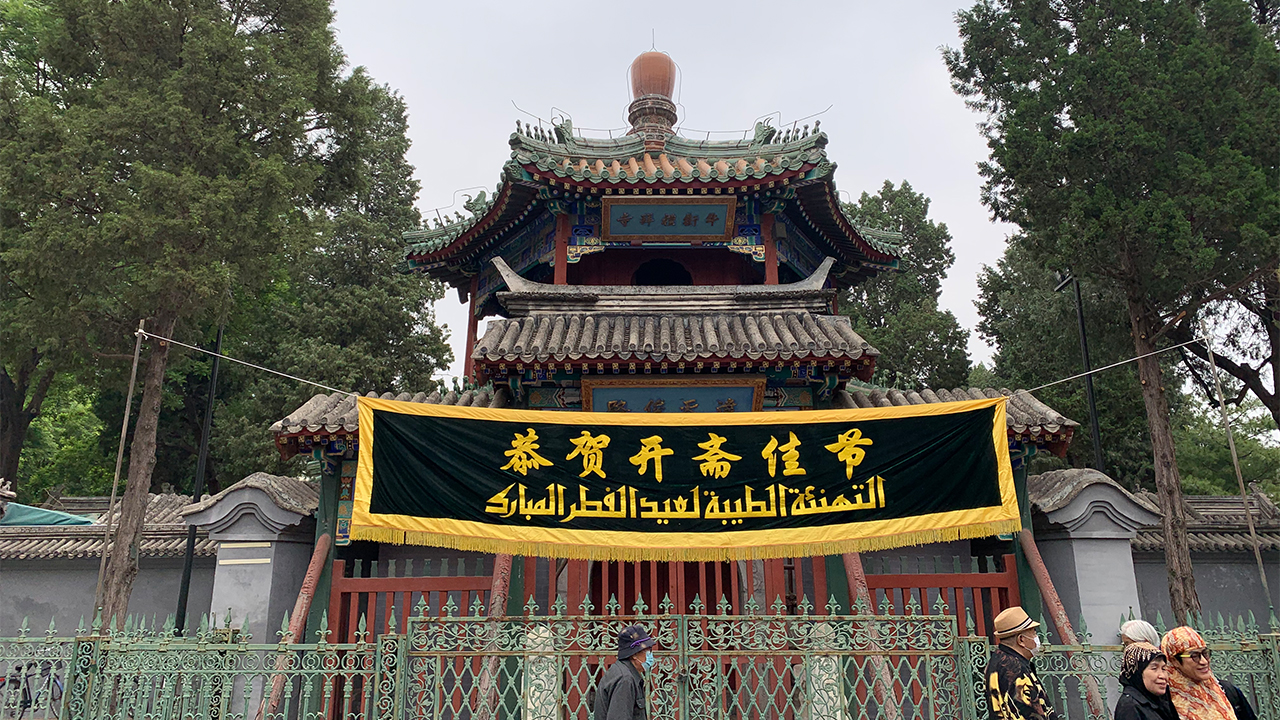
Muslims in Beijing celebrated Eid al-Fitr on Thursday with religious zeal and cultural zest amid strict COVID-19 containment measures.
Eid al-Fitr is one of the most important Muslim festivals celebrated around the world after the culmination of Ramadan, the Islamic month of fasting.
Exuding a heady smell of incense amidst sweeter whiffs of essential oils, Beijing's oldest Niujie Mosque, first built in 996, opened its doors early morning to both locals and foreigners willing to partake in the prayer.
Although COVID-19 is under control in Beijing and a large number of residents have already been vaccinated, the authorities took prevention measures to ensure the safety of the attendees and avert a possible spread of the disease.
Besides mandatory mask-wearing, temperature checks at gates and advisory to observe social distancing, the entry to the mosque was capped and by online reservation only for a time slot of 7 a.m. to 10 a.m.
Apart from presenting the reservation code, the visitors were mandated to register via the commonly used "Beijing Health Kit" mini app that takes into account the user's travel history, past COVID-19 test results and vaccination status.
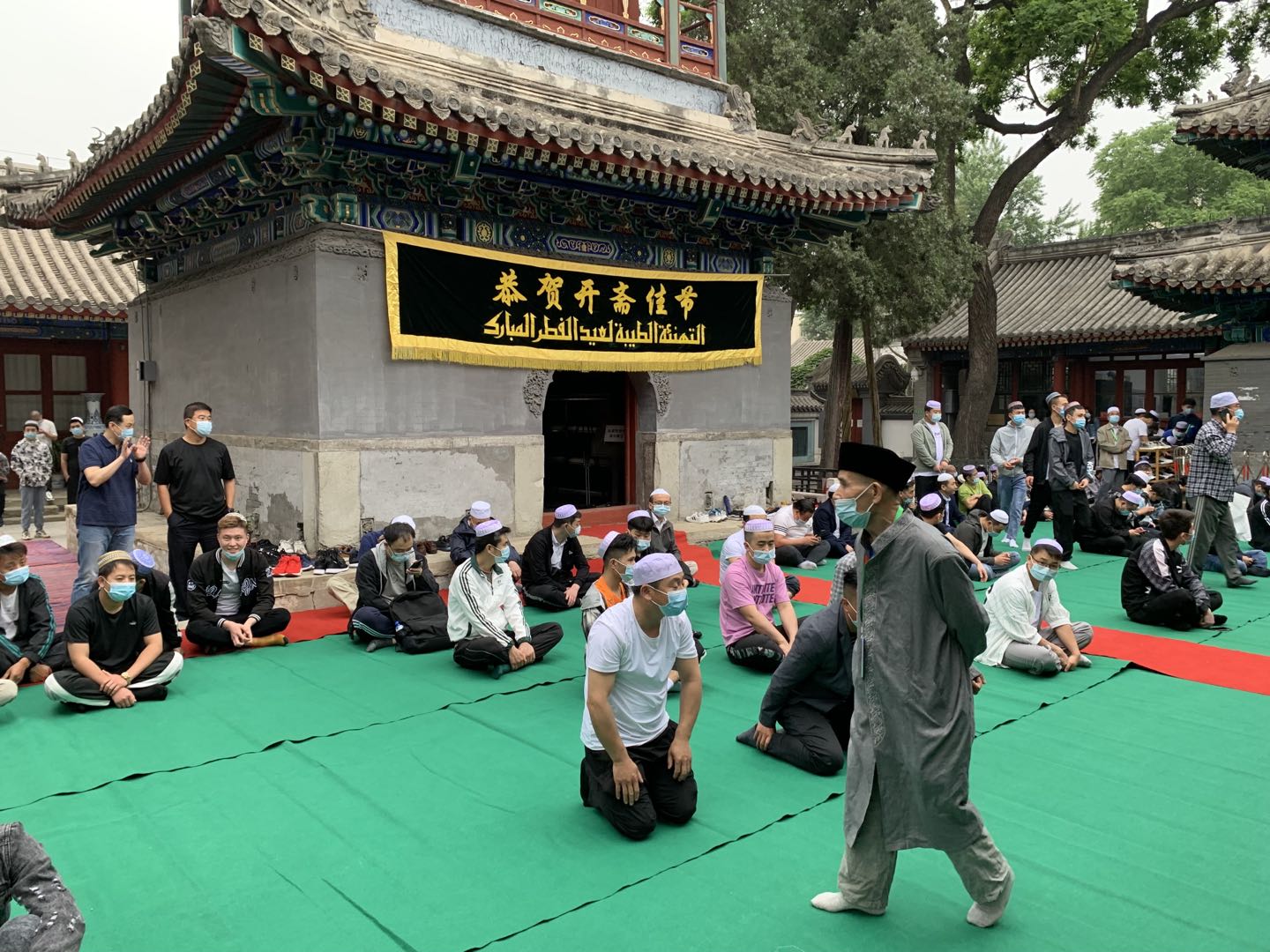
The courtyard outside the main prayer area at Niujie Mosque, Beijing, China, May 13, 2021. Moosa Abbas/CGTN
The courtyard outside the main prayer area at Niujie Mosque, Beijing, China, May 13, 2021. Moosa Abbas/CGTN
Arrangements and gathering
The day started at 7 a.m. as visitors, dressed simply but tastefully, wearing a cap typical of people from China's Hui ethnic group, began gathering in the mosque.
On a day not sunny but warmed by the arrival of early summer, pleasantries were exchanged along with bottles of scents that are customary to wear on a solemn occasion like this.
The mosque has a separate hall for women to offer prayers, solo or in congregation, before they come mingle with the male members of their family in the courtyard. Be it the main area, the yard or the women's hall, the preparations were immaculate – from neatly assembled shoe racks to gracefully aligned prayer mats.
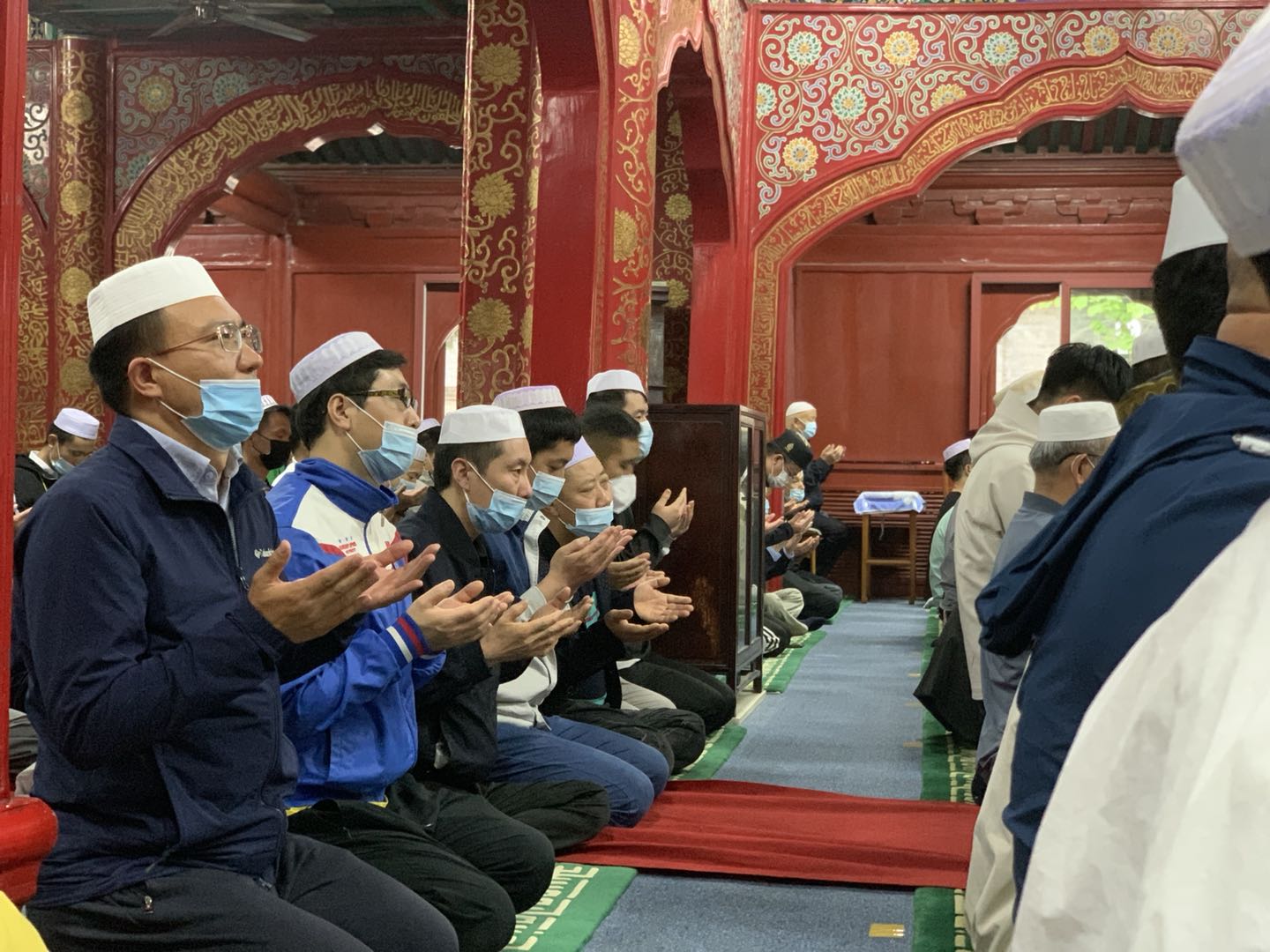
People praying at Niujie Mosque, Beijing, China, May 13, 2021. Moosa Abbas/CGTN
People praying at Niujie Mosque, Beijing, China, May 13, 2021. Moosa Abbas/CGTN
Prayer and sermon
After two hours of chitchat, exchange of greetings, self-reflection in the peaceful atmosphere of the mosque and a bunch of selfies, the formal proceedings began at 9 a.m. with the arrival of prayer leaders into the main prayer area.
After a quick exchange of greetings and assembly, the first sermon began.
Addressing the attendees, the prayer leader first explained the significance of Eid in Islam and gave an overview of some aspects of the Islamic history.
Recalling how the gathering couldn't take place last year due to COVID-19, he said he was thankful to the nation and the government for effective pandemic control which made the congregation possible this year.
"The reason I said this year's Eid al-Fitr is special is because we didn't have it last year. We spent our last Eid at home... We ought to be grateful this year for a really special Eid."
The speaker also made reference to a saying often shared on Douyin, Chinese version of TikTok: "It's not that there is no war in the world, it's just that we live in a peaceful country."
He said this saying also applied to the current situation in China in the context of the pandemic: "It's not that the coronavirus has left the world, it's just that we live in country that has brought the virus under control."
The sermon was followed by the congregational prayer for Eid and dua, or supplication, with prayers and wishes for health, wealth and prosperity. Soon after the prayer, a more formal second sermon took place. While the first one was a more heart-to-heart with the locals, the second one was more formal and in Arabic.
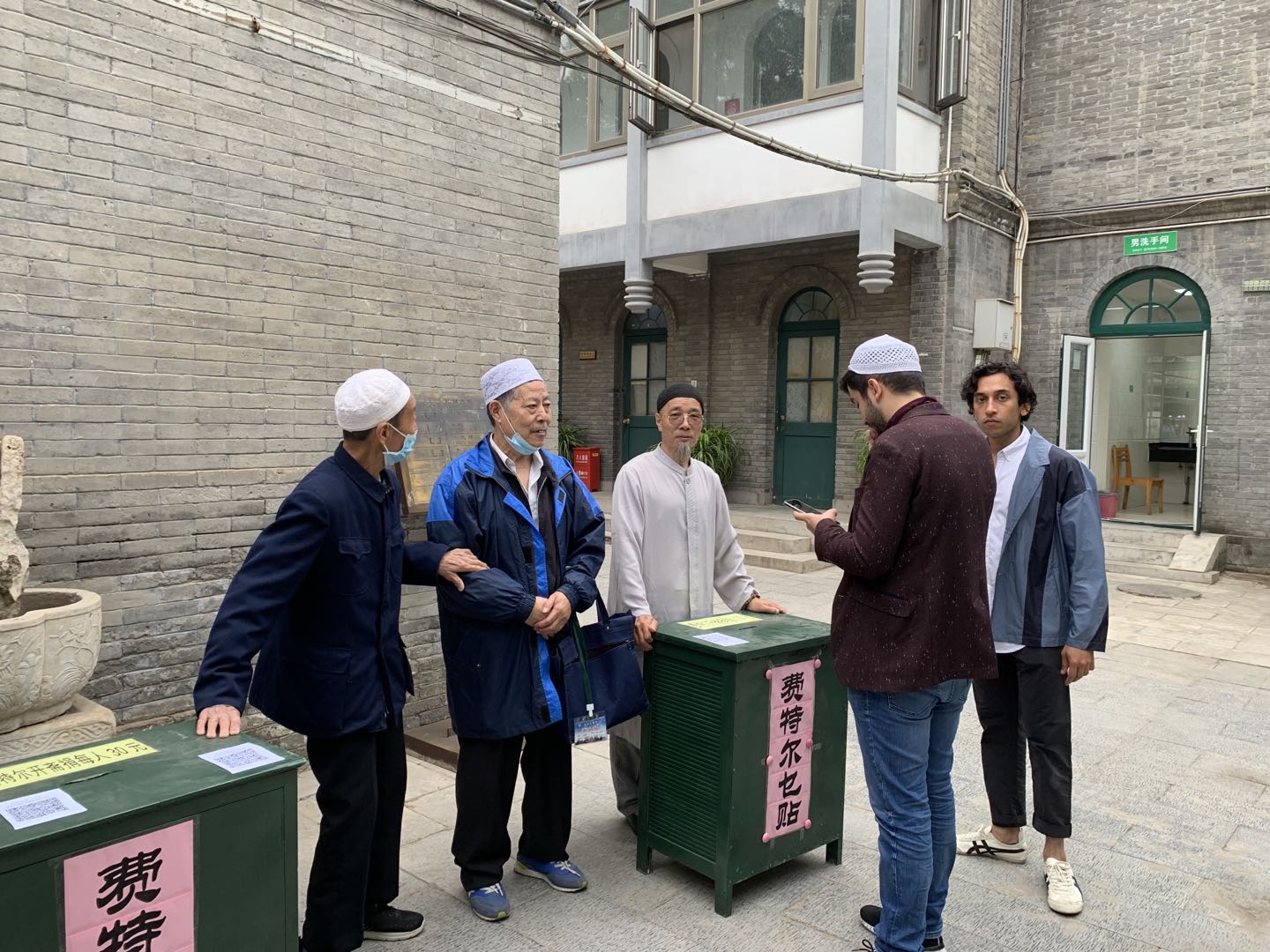
Muslims giving fitrah, charitable donation specific to Eid, at Niujie Mosque, Beijing, China, May 13, 2021. Moosa Abbas/CGTN
Muslims giving fitrah, charitable donation specific to Eid, at Niujie Mosque, Beijing, China, May 13, 2021. Moosa Abbas/CGTN
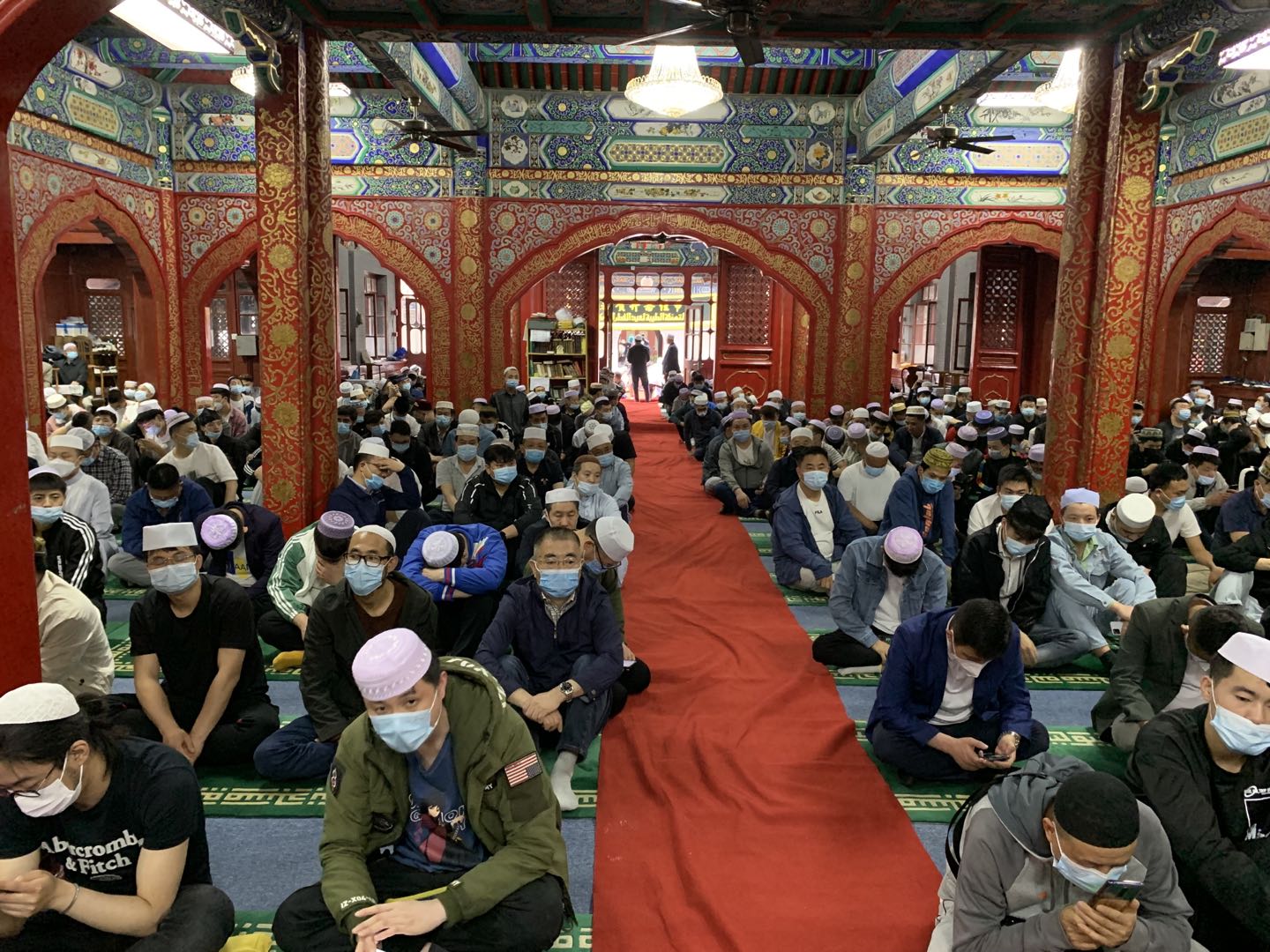
Muslims gathered inside the prayer area at Niujie Mosque, Beijing, China, May 13, 2021. Moosa Abbas/CGTN
Muslims gathered inside the prayer area at Niujie Mosque, Beijing, China, May 13, 2021. Moosa Abbas/CGTN
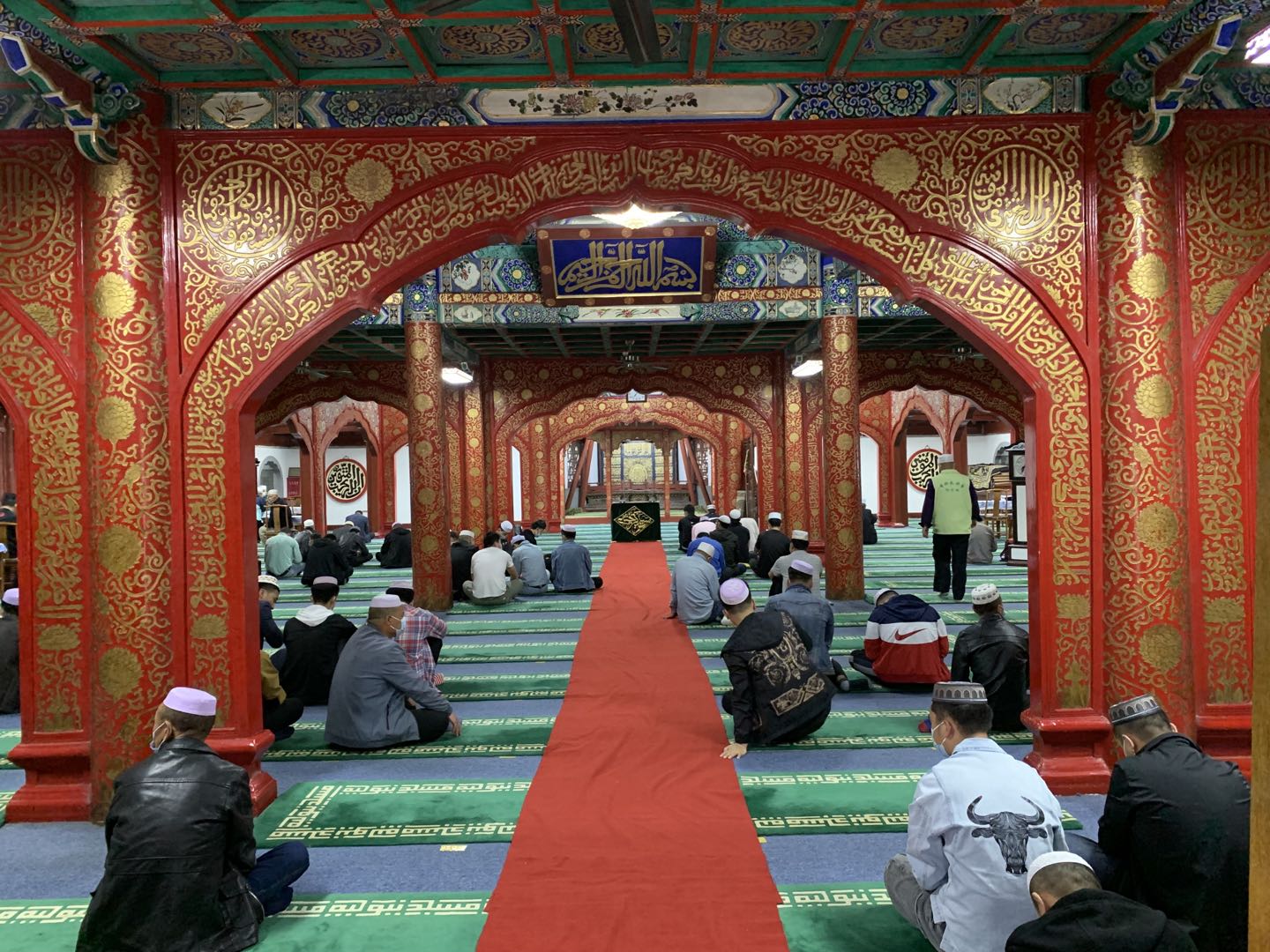
Muslims gathered inside the prayer area at Niujie Mosque, Beijing, China, May 13, 2021. Moosa Abbas/CGTN
Muslims gathered inside the prayer area at Niujie Mosque, Beijing, China, May 13, 2021. Moosa Abbas/CGTN
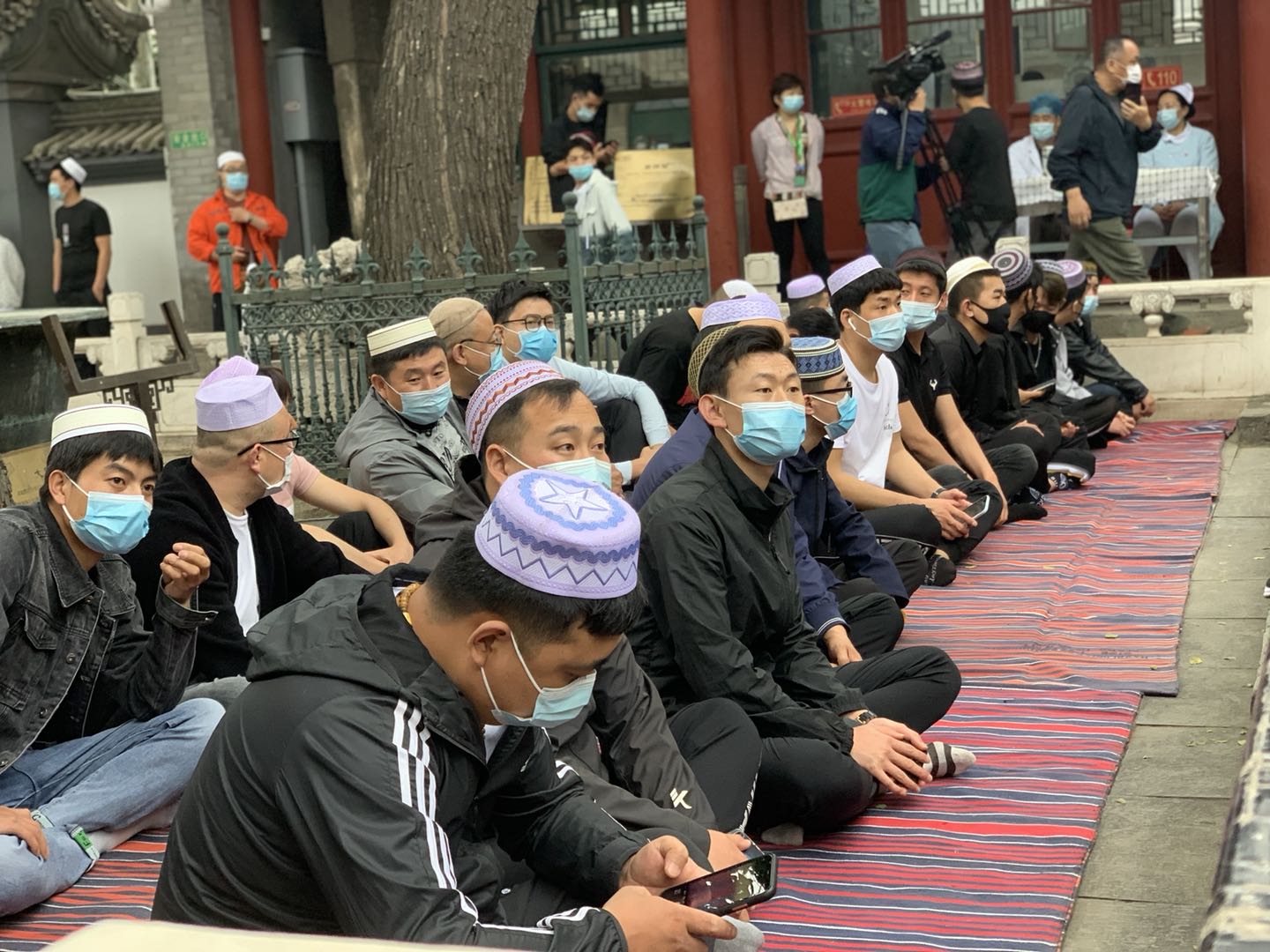
Muslims gathered in the courtyard at Niujie Mosque, Beijing, China, May 13, 2021. Moosa Abbas/CGTN
Muslims gathered in the courtyard at Niujie Mosque, Beijing, China, May 13, 2021. Moosa Abbas/CGTN
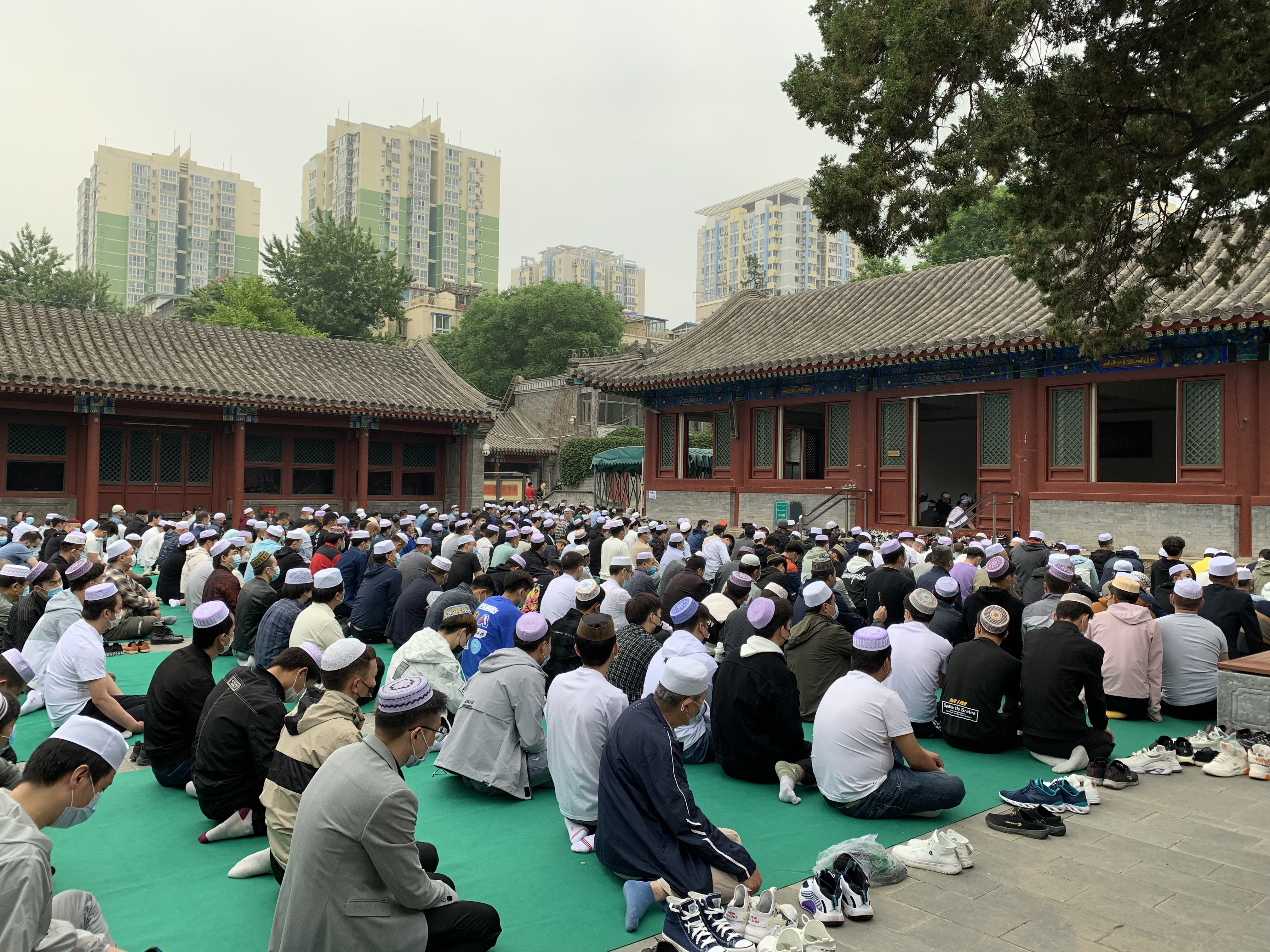
Muslims gathered in the courtyard at Niujie Mosque, Beijing, China, May 13, 2021. Wang Yan/CGTN
Muslims gathered in the courtyard at Niujie Mosque, Beijing, China, May 13, 2021. Wang Yan/CGTN
Joy and gratitude
After the second sermon, the prayer leader wished everyone a joyous Eid. As soon as these last words left his mouth, a wave of elation swept across the attendees who then got up to hug and wish others the same.
People then gathered again in the courtyard with their families – albeit for a short while, due to COVID-19 concerns, took some pictures and socialized before they dispersed around 10 a.m.
Liu Shoupeng, a part of community management at Niujie Mosque, told CGTN how happy he was for being a part of Eid prayers and celebrations at a time when "many countries are still stuck with the coronavirus pandemic."
"Our nation has a huge population and a large territory, but we have still managed to contain the virus," said the elderly man, flanked by his friends and family members.
Sun Jia, a Beijing local from ethnic Hui group, also expressed his delight to have attended the gathering this year.
"In the sermon, we were taught to be strong and win the battle against coronavirus. Don't be afraid of the pandemic! We can beat the virus with our faith," he said.
When asked about the culinary highlights of the festival, Sun said he was especially fond of fried beef, a specialty in Hui cuisine. "We often eat along Niujie Street. We have a lot of Halal restaurants in this area," he added.
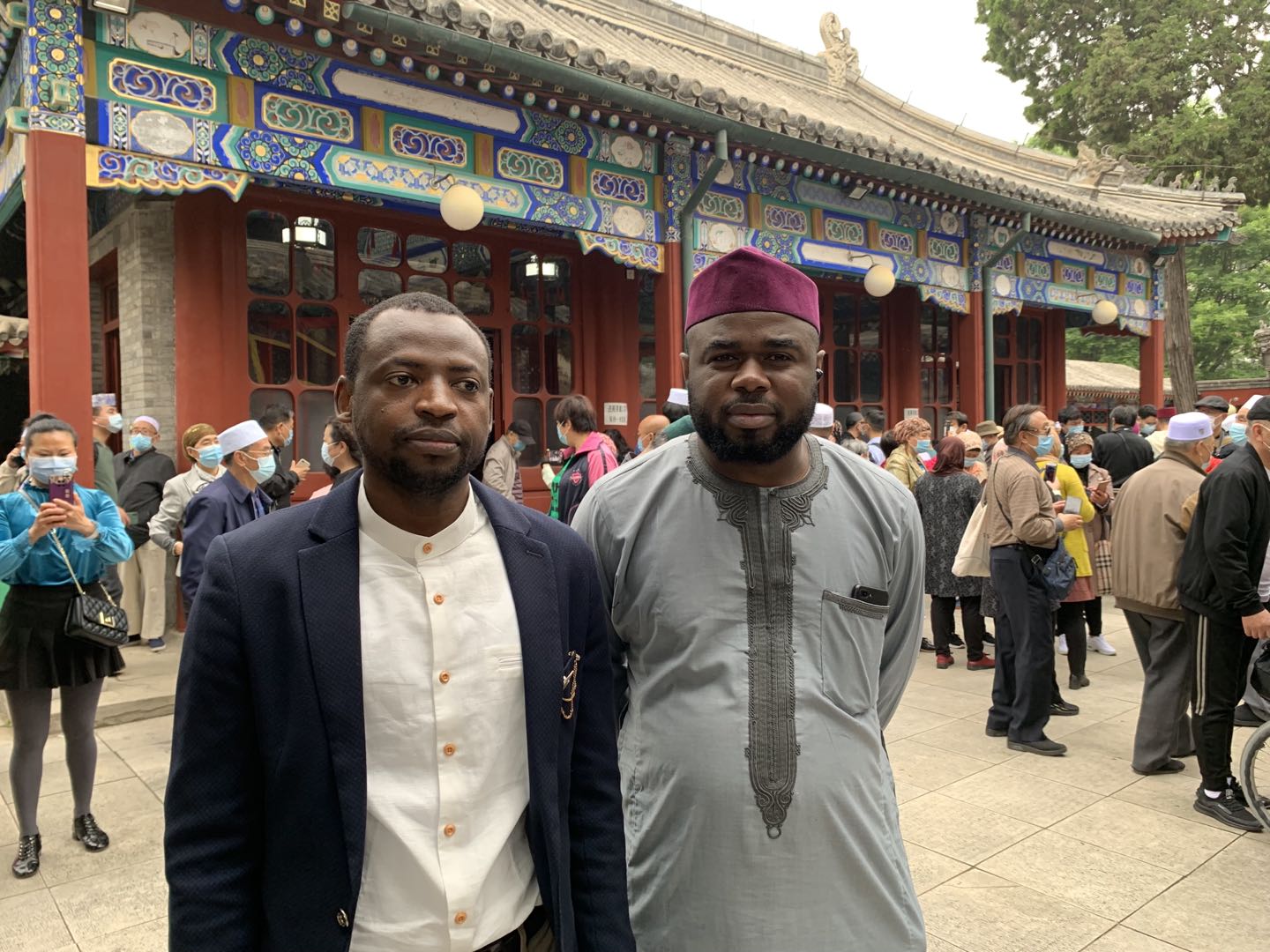
Abba Garba and Aminu Darma, PhD scholars from Nigeria, at Niujie Mosque, Beijing, China, May 13, 2021. Moosa Abbas/CGTN
Abba Garba and Aminu Darma, PhD scholars from Nigeria, at Niujie Mosque, Beijing, China, May 13, 2021. Moosa Abbas/CGTN
Eid away from home
A number of foreign Muslims also marked the event along with their Chinese counterparts.
Abba Garba and Aminu Darma, PhD scholars from Nigeria, told CGTN that they were happy to be celebrating Eid in a country where the pandemic was under control but recounted some experiences that one could only have in one's hometown.
"For me, I have what I will call tuwo (a dish made from multiple grains), which you come back from Eid [prayer] and you take it, and then you visit your communities, neighbors and the rest," he said, speaking of dishes commonly enjoyed on Eid in Nigeria.
Striking a chord with his compatriot, Garba talked about the importance of new clothes, especially to children, and the excitement they bring on Eid in their home country.
Taha Ather, a student of electrical engineering from Pakistan, told CGTN he was pretty satisfied with the anti-pandemic measures at the mosque, which he said he was visiting for the first time as he usually frequented a different mosque in Haidian District every Friday.
"It is exciting here to see new people, new culture, new traditions. So, it was a good experience," said Ather, when asked about how he felt the celebrations here were different from his hometown.
(Cover: An external view of Niujie Mosque, Beijing, China, May 13, 2021. Wang Yan/CGTN)

